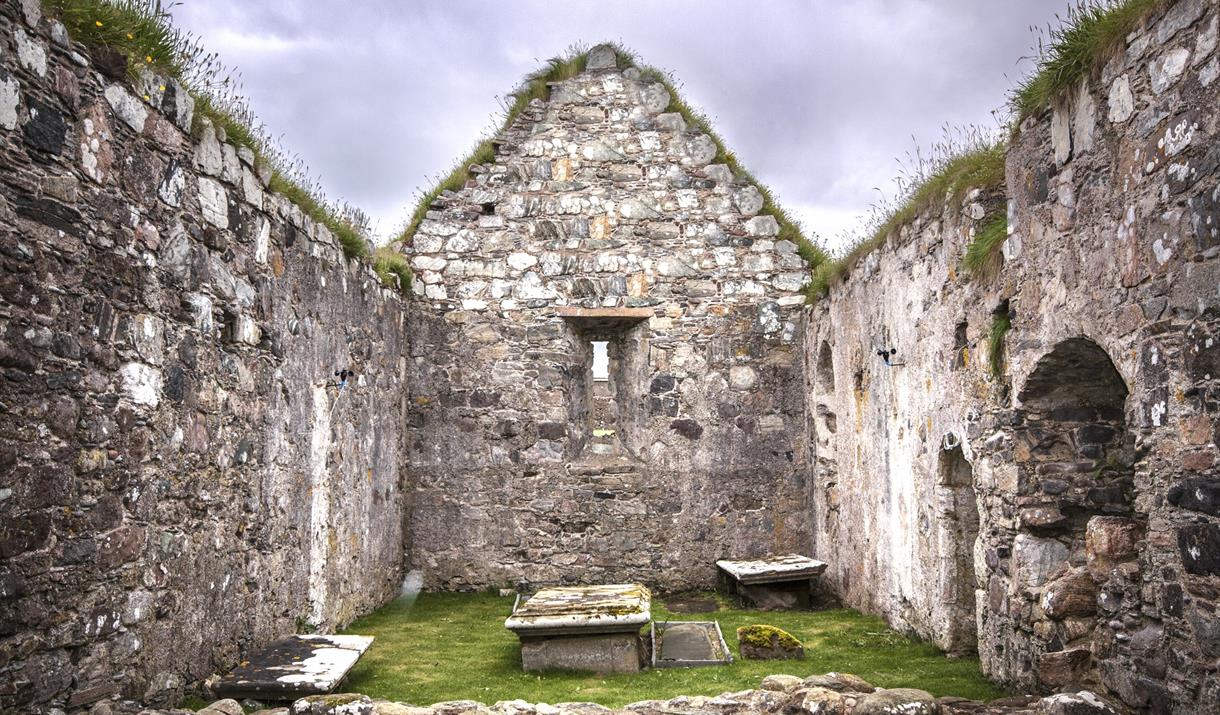To provide you with the best experience, cookies are used on this site. Learn more

To provide you with the best experience, cookies are used on this site. Learn more


It was built to a simple rectangular plan, with the nave and chancel probably divided by rood screen, over which was a rood loft lit by a window high in the south wall. A narrow doorway led to a vestry or sacristy, and the interior was plastered and painted. At this time the sea would have been some distance off, with plenty of space for a burial ground on all sides of the church: today the sea batters against the north wall of the church. However, during the period of the Lordship of the Isles most of the West Highland chiefs were buried at Iona in the lay cemetery of Reileig Oran, so it was probably not envisaged originally as a resting place for the clan chiefs.
The church was dedicated to Saint Columba, the founder of the great 6th century abbey at Iona, who is credited in large part with the Conversion of Scotland. Many churches built in the later Middle Ages had this dedication.
Eaglais na h-Aoidhe underwent alterations in the 15th and earlier 16th centuries, and several periods of work can be distinguished in its masonry. The Macleods of Lewis started to use the chancel as a place of burial, and the church took on its final form with the additional of a burial aisle at the west end. The most celebrated of the graveslabs within the church is probably that of Roderick Macleod, VII of Lewis. He held Lewis during the latter part of the 15th century, and was the father of Torquill VIII and grandfather of John Mackinnon, the last abbot of Iona.
Roderick died in 1498, and is commemorated on his graveslab as a warrior, with broadsword and spear, and dressed in a helmet, mail 'collar' and quilted body-armour.
For many years the church has stood as a roofless and increasingly unstable shell, but the long process of re-roofing and restoration is underway, championed by the local community.
This may not have been the first church on the site. A local tradition maintained that 'the church was built on the site of a cell occupied by St Catan, who is believed to have lived in the sixth or seventh century' (W.C. Mackenzie, 1919). Catan was an early Irish saint, who became bishop of Bute, and chapels dedicated to him can be found scattered throughout many parts of Scotland. It is likely that Catan, or some of his followers, established a small chapel in the area, of which no trace now is known. However, the footings of an early chapel survive at Taigh an t-Sagairt, 4 kms to the south-east.
Before any ecclesiastical presence on the site, people had been living and working there over several millennia: midden deposits containing winkle, limpet and mussel shells, fishbones, animal bones and stone tools are exposed from time to time along the shore, and over the years these deposits have built up to more than 2m in height below the foundations of the church. Not far from the church, remains of a small late Iron Age building with an earth floor, stone walls and a hearth were found in 1937, associated with more pottery and animal bones.
Recently Viewed
Garage
Showers
Self Catering
Seaside Cottage is superbly situated in a stunning location in West Tarbert overlooking the sea,…
Garage
Waste Disposal
Airports
There are up to 2 flights a day from Stornoway to Edinburgh. The flight time is apporximately 1…
At the eastern end of the Braighe isthmus stands a striking memorial to the Aignish Farm…
The Braighe is the stretch of land (isthmus) linking Point and the villages of Branahuie…
Garrabost Mill is currently undergoing restoration as a historical visitor attraction and…
This communal burial tomb would have been an important highly visible monument of the…
Busy home studio to Stornoway artist, Seonaid Clarke, where she enjoys creating detailed…
The Iolaire Monument is a memorial to those who perished on the HMY Iolaire which sunk on…
Clach Ghlas (NF 5281 3340) is an enigmatic triangular standing stone 1.7 metres high,…
Traigh Pabail or Bayble Beach in Point is a small sandy cove with a pier, just beyond the…
The Italianate Clocktower remains from the original elementary and infant school built in…
A large (in island terms) social housing project for rent which fits an urban site where…
The largest arts facility in the Outer Hebrides and comprises a gallery, performance…
A Stornoway landmark, built in 1878. Martin’s Memorial Church was designed by RA Bryden.
An Lanntair’s award winning building, designed by Nicoll Russell Studios, is inspired by…
Photograph © David Wilson
The police station is off course where Detective Fin…
A downloadable guide to galleries and retail outlets where visual art and craft, made in…
A downloadable 20 page guide to Stornoway. Navigate through a detailed map featuring…